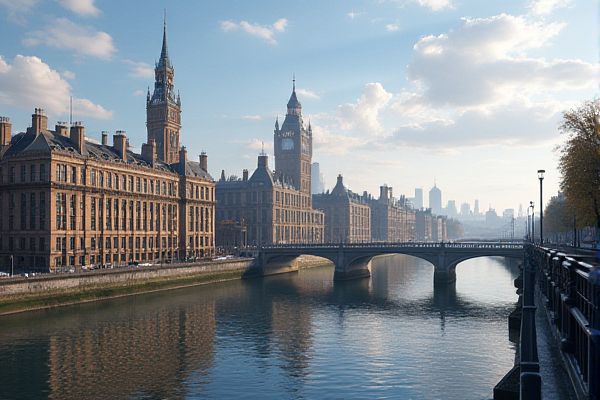
Education system and best schools in United Kingdom: Comprehensive education system in the UK. National curriculum followed by most schools. GCSEs and A-Levels key exams. Private and public school options available. OFSTED inspects and rates schools. Primary education from age 4-11. Secondary education from age 11-18. University education typically 3-4 years. Russell Group universities are prestigious. Best schools: Eton, Harrow, St Paul's.
Comprehensive education system in the UK.
Comprehensive Schools in the UK are secondary institutions that provide a broad curriculum, integrating elements of grammar, technical, and secondary modern schools, while eliminating selection based on academic achievement or aptitude. The aim of these schools is to democratize education and offer equal opportunities to all children. For further insights into the structure and impact of these schools, you can explore more on Britannica, which provides extensive information on the subject.
National curriculum followed by most schools.
The UK education system is structured around the National Curriculum, which mandates that all local-authority-maintained schools adhere to its guidelines, encompassing four Key Stages, from KS1 to KS4. These stages include specific subjects and assessments designed to ensure a comprehensive educational foundation. Interestingly, academies and free schools have the option to opt-out of this strict framework. However, they are still obliged to deliver a broad and balanced curriculum, ensuring that core subjects like English, Maths, and Science are effectively taught. For more detailed insights into the operations and structure of this system, you can explore the UK Curriculum and School Year on Teachin's website.
GCSEs and A-Levels key exams.
In the UK, GCSEs (General Certificate of Secondary Education) are crucial exams taken at the age of 15/16, marking the end of compulsory education, while A-Levels are taken in further education as a prerequisite for higher education. Students typically take three or four subjects to prepare for university entry, playing a significant role in shaping their academic future. For more detailed information on the intricacies of the UK's education structure, you can explore the insights available on the International Student website.
Private and public school options available.
In the UK, students have the option to attend either state schools (public schools) which are free and government-funded or independent schools (private schools) which require tuition fees. Over 90% of students attend state schools, while independent schools, including those offering the International Baccalaureate, provide an alternative with their own fees and admission criteria.
OFSTED inspects and rates schools.
In the UK, schools are inspected and rated by Ofsted (the Office for Standards in Education), which evaluates schools based on hard performance data and qualitative evidence, assigning ratings of Outstanding, Good, Requires Improvement, or Inadequate. Inspections are typically announced only one or two days in advance to prevent schools from preparing specifically for the inspection. For more detailed insights on the evaluation process, you can refer to this comprehensive study by the University of Bristol, which delves into the implications of these inspections on the educational landscape.
Primary education from age 4-11.
Primary Education in the UK, for children aged 4 to 11, encompasses a variety of school types, including primary, infant, junior, first, middle, and special schools. All of these institutions adhere to the same curriculum, which is organized into Key Stages 1 and 2. This curriculum encompasses essential subjects such as English, mathematics, science, and more. Periodic assessments are conducted at the end of each key stage to evaluate student progress. For more detailed information, you can refer to the extensive resources provided by the Cambridgeshire County Council.
Secondary education from age 11-18.
Secondary education in the UK, spanning ages 11-18, is divided into Key Stages 3 and 4, followed by an optional sixth form. Key Stage 3, which includes years 7-9, offers a broad curriculum designed to provide a comprehensive educational foundation. In contrast, Key Stage 4, covering years 10-11, focuses primarily on preparing students for GCSE exams. The subsequent sixth form, encompassing years 12-13, provides students with opportunities to pursue AS and A-levels, BTEC, or other qualifications, allowing for further specialization and preparation for higher education or professional pathways.
University education typically 3-4 years.
University education in the UK typically lasts three to four years for undergraduate courses, with prestigious institutions such as the University of Oxford, University of Cambridge, and Imperial College London being among the top universities. These esteemed universities offer a variety of qualifications, including Bachelor, Masters, and Doctorate degrees. To learn more about the UK's higher education framework, you can visit the detailed overview on the Edvoy website. This system is renowned for its rigorous academic standards and comprehensive programs, attracting students from around the globe.
Russell Group universities are prestigious.
The Russell Group consists of 24 world-class, research-intensive universities in the UK, known for producing over two-thirds of the world-leading research, significant economic impact, and attracting international students and staff due to their high quality and reputation. For more details about these prestigious institutions, you can visit the Russell Group website, where the excellence and influential roles of these universities are highlighted, underscoring their importance within the global academic and research landscape.
Best schools: Eton, Harrow, St Paul's.
Eton, Harrow, and St Paul's are among the UK's most prestigious boarding schools. Eton, founded in 1440, is renowned for academic excellence and a broad curriculum, with notable alumni including 20 UK Prime Ministers. Harrow School, established in 1572, is known for its inclusive co-curricular program, impressive sports teams, and distinguished alumni such as Lord Byron and Winston Churchill. St Paul's School, founded in 1509, emphasizes academic excellence, character development, and has a prestigious rowing program, with notable alumni including Samuel Pepys and George Osborne.
